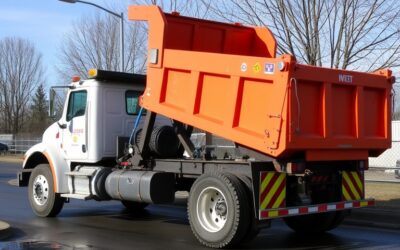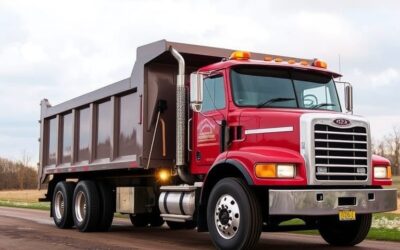Running dump trucks safely and efficiently is critical for fleet managers and drivers alike. Mistakes in dump truck operations can lead to serious accidents, expensive repairs, and lost time. Understanding these common errors and knowing how to avoid them is key to maintaining a well-functioning and safe operation.
One of the critical areas where mistakes often occur is in loading and balancing the cargo. Incorrectly loaded trucks can become unstable, increasing the risk of tipping over. Regular maintenance checks are also frequently neglected, leading to mechanical failures that could have been prevented. Moreover, unsafe driving habits contribute to a significant number of accidents involving dump trucks.
The advent of safety technologies has provided many tools to assist in dump truck operations, yet some operators fail to utilize these advancements. Using these technologies effectively can enhance safety and efficiency. This article delves into these common mistakes and offers practical advice on how to avoid them, ensuring safer and more efficient dump truck operations.
Improper Loading and Balancing of Cargo
One of the biggest mistakes in dump truck operations is improper loading and balancing of cargo. When loading a dump truck, it’s crucial to distribute the weight evenly. Uneven loads make your truck unstable, increasing the risk of a dangerous tip-over. Always center heavy loads and balance the materials in the bed to maintain stability. Avoid piling weight on one side or overloading the front or back of the truck.
Another important consideration is the type of material being transported. Different materials behave differently in transit. For instance, loose gravel can shift more easily than solid debris. Always take the material’s characteristics into account when loading. Overloading the truck beyond its capacity is another common mistake that compromises vehicle stability and safety. Staying within recommended load limits not only keeps the truck balanced but also extends its lifespan by reducing wear and tear on its components.
Neglecting Regular Maintenance Checks
Regular maintenance checks are an essential part of safe dump truck operation, yet they are often neglected. Skipping maintenance can cause avoidable mechanical failures. Key components, like the hydraulic system, tires, and brakes, need regular inspection and servicing. The hydraulic system, which controls the dump bed, should be checked for leaks and worn parts to prevent failures during operation.
Tires are another critical area requiring attention. Check tires for proper inflation, tread wear, and damage before each trip. Underinflated or worn tires can adversely affect handling and increase the risk of accidents. Brakes should also be inspected regularly to ensure they are working correctly. Good brakes are your best defense when stopping a heavy truck safely. Keeping up with regular maintenance schedules helps avoid unexpected breakdowns and ensures the truck operates safely and efficiently.
Unsafe Driving Habits
Adopting unsafe driving habits is a significant mistake that can lead to accidents and other serious consequences in dump truck operations. One of the most common unsafe practices is speeding. Dump trucks are heavy vehicles that require longer stopping distances, especially when fully loaded. Speeding reduces control and ups the risk of rollovers and collisions. Maintaining a safe and consistent speed, particularly in construction zones or on uneven terrain, is essential for safe operations.
Another unsafe habit is ignoring road conditions. Dump truck drivers must remain vigilant about the terrain they are traversing. Wet, icy, or uneven surfaces can pose a higher risk for tipping or getting stuck. Taking sharp turns too quickly or not slowing down for bumps and potholes can destabilize the truck. Additionally, drivers should be cautious when backing up and always rely on mirrors and backup alarms or cameras to avoid accidents. Staying alert and exercising caution improves both safety and efficiency.
Failure to Utilize Safety Technologies
Ignoring safety tech is a mistake that could cost you. Modern dump trucks are equipped with various safety features designed to minimize risks and enhance driver awareness. For example, our Wink Anti-Tip system is designed to prevent tipping by automatically lowering the dump bed when instability is detected. Failing to utilize such technologies can lead to avoidable accidents and downtimes.
Additional safety technologies, such as backup cameras, proximity sensors, and GPS tracking, can further improve safety. Backup cameras and sensors help the driver see blind spots and avoid obstacles, while GPS tracking ensures that trucks follow the safest and most efficient routes. Embracing these technologies not only enhances safety but also improves operational efficiency. When operators neglect these tools, they miss out on opportunities to create a safer working environment and improve overall productivity.
Final Thoughts
Avoiding common mistakes in dump truck operations is essential for maintaining safety and efficiency. Proper loading and balancing of cargo, regular maintenance checks, safe driving habits, and the use of advanced safety technologies all play crucial roles in ensuring that dump trucks operate smoothly and safely. Each of these elements contributes to reducing the risk of accidents, enhancing the lifespan of the vehicles, and improving overall operational productivity.
Address these common mistakes to make your dump truck operations safer and more efficient. Want to prevent tipping incidents and improve safety? Visit Wink Anti-Tip today to see how our tech can transform your fleet. Discover how our advanced dump truck safety technologies can transform your dump truck operations and ensure a safer working environment for everyone involved.





